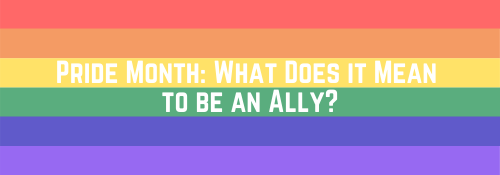
June is Pride Month and we want to take a moment to talk about allyship. An LGBTQIA+ ally is anyone who takes action to end oppression of the queer community through partnership with and support for the LGBTQIA+ community. This stance can embrace anyone - those who do not identify under the LGBTQIA+ umbrella themselves as well as people within the community (e.g., a cisgender lesbian who advocates for transgender rights). Here are some tips for stepping up as an ally:
- Believe that issues related to oppression are everyone’s concern. Furthermore, believe the queer community when they are discussing their experience of oppression. Just because you have not encountered such oppression does not mean it isn’t happening to others.
- Understand that people who are LGBTQIA+ are experts on their own experience and that we can learn a lot from them. At the same time, take responsibility for your own education as an ally. Don’t leave it up to the queer community to give you all your answers—engage in conversation that can be mutually educational and enlightening.
- Acknowledge your own feelings in your role as ally and come to terms with them. Make it your responsibility, not that of the queer folks you’re partnering with, to manage your feelings.
- Send gentle signals to show your acceptance and support as an ally. LGBTQIA+ people often keep watch for signs from others to figure out if it is safe to be open with them.
- Have courage to take risks and make mistakes when practicing allyship. Just as it takes courage for our LGBTQIA+ loved ones to be open and honest about who they are, it sometimes takes courage even just to support them in the world we live in. Allies may in fact have their own coming out experience when advancing causes and issues related to the LGBTQIA+ community in a group whose own beliefs are unclear. Also have courage to acknowledge and apologize for mistakes—don’t overemphasize or dismiss them, just learn from them.
- Finally, create opportunities to take real action to reduce oppression of LGBTQIA+ people. For example, support businesses with clear anti-discrimination policies, state that you don’t appreciate “humor” that demeans the queer community in personal conversations, or speak with your political representatives on issues that impact the LGBTQIA+ community—especially if their stance is not affirmative.
This message was crafted by the PACES LGBTQIA+ Work Group, a group working to learn from each other and educate Wyandot BHN staff about how to create a safe space for clients and families with diverse sexual orientation and/or gender identity.
